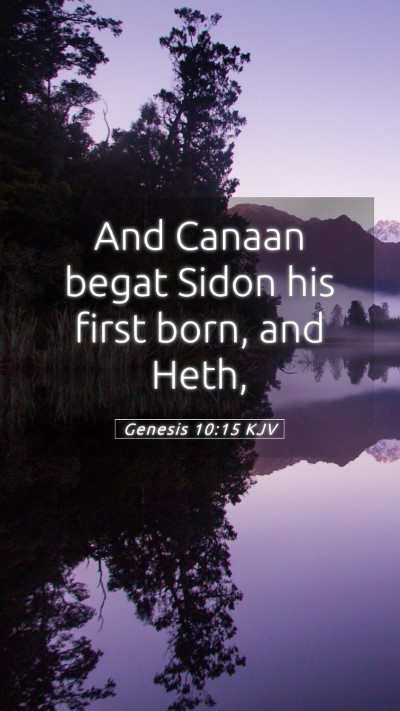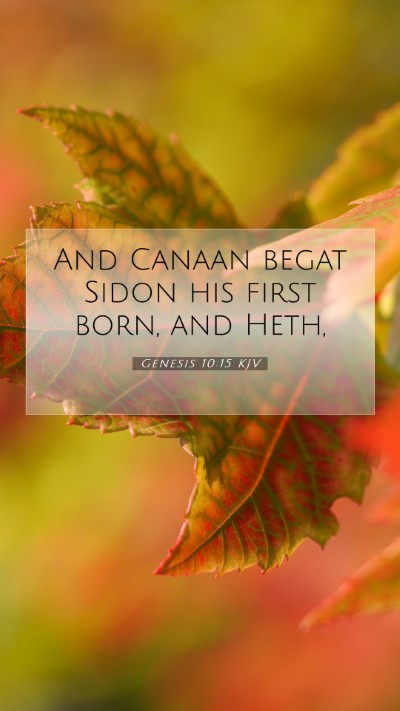Bible Verse Meaning: Genesis 10:15
This passage from Genesis holds significance in understanding the genealogy and ethnic origins outlined in the early chapters of the Bible. In Genesis 10:15, we read:
"And Canaan begat Sidon his firstborn, and Heth." (Genesis 10:15, KJV)
Overview
The genealogy presented in Genesis 10, often referred to as the Table of Nations, highlights the descendants of Noah's sons—Shem, Ham, and Japheth. This verse specifics the lineage of Canaan, one of the sons of Ham.
Commentary Insights
Insights from prominent public domain commentaries provide deeper understanding of this verse:
Matthew Henry’s Commentary
According to Matthew Henry, this passage serves to establish the connections between various nations of the world. The mention of Sidon indicates the establishment of a significant Phoenician city, which played a crucial role in trade and maritime activities. The reference to Heth introduces the Hittites, another important group whose historical presence is noted in both biblical and extra-biblical records.
Albert Barnes’ Notes
Albert Barnes elaborates on the significance of Canaan’s descendants. He points out that the Canaanites were among the most prominent groups inhabiting the land of Canaan, which holds prophetic implications regarding Israel's conquest of that territory. Understanding this genealogy provides insight into the subsequent events in the Old Testament, particularly the struggles that the Israelites faced against Canaanite nations.
Adam Clarke’s Commentary
Adam Clarke discusses Canaan's role in the biblical narrative. Canaan not only gives rise to Sidon and Heth but also lays the groundwork for the understanding of territorial boundaries and cultural developments in the region. Clarke suggests that recognizing these names and their implications is crucial for understanding Israel's historical and theological context in the Old Testament.
Theological Significance
This verse reveals the intersection of faith, history, and culture. The biblical account serves not merely as a historical record but also as a means through which God’s unfolding plan is revealed. The lineage of Canaan is critical for comprehending the biblical themes of judgment, land, and divine promise.
Application for Today
For contemporary readers, understanding Genesis 10:15 encourages a deeper look at how genealogies can reflect broader themes in Scripture. It invites us to consider:
- The significance of ancestry and heritage in our own lives.
- The impact of historical narratives on our understanding of current events.
- The continuity of God's story through generations, prompting reflection on our place within that narrative.
Cross References
This verse relates to various other passages in the Bible, enhancing our comprehension through cross-references:
- Genesis 9:24-25 - Discusses Noah's curse on Canaan.
- Deuteronomy 7:1-2 - God commands Israel regarding the Canaanite nations.
- 1 Chronicles 1:13-16 - Provides further genealogy of Canaan’s descendants.
Conclusion
In summarizing the meaning of Genesis 10:15, we can see that genealogies serve essential roles in Scripture. They connect us to history, highlight God’s providential care, and remind us of the faithfulness required to navigate our spiritual journeys. Understanding Scripture through this lens enriches our Bible study insights and deepens our appreciation for Biblical exegesis.
Further Study and Reflection
For those seeking to engage more deeply with Scripture, consider these activities:
- Join a Bible study group focused on genealogies in the Old Testament.
- Utilize Bible study tools to explore the context and meanings of similar verses.
- Reflect on the application of Bible verses in daily life and personal heritage.


